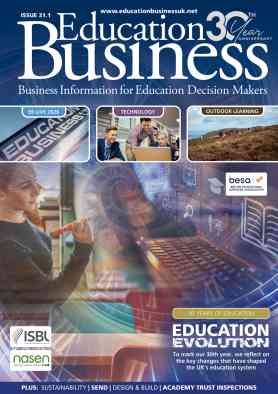
The top challenges for ICT leaders
According to research from BESA, 57 per cent of primary and 61 per cent of secondary teachers have said training teachers in all areas of ICT is their key challenge over the next 12 months
On average, primary school pupils spend 53.7 per cent of their time engaging with ICT in the classroom, as do 55.5 per cent of secondary school pupils, according to research from the British Educational Suppliers Association (BESA).
As such, the influence that technology has on children and young people is significant, as is the pressure on schools to teach it right.
However, the research also revealed that training teachers adequately in the use of ICT resources is the biggest challenge for ICT leaders, with fifty-seven per cent of primary and 61 per cent secondary teachers citing it as their key challenge over the next 12 months.
The survey also found that 51 per cent of primary school teachers, and 49 per cent of secondary school teachers need training in e-safety issues, while 51 per cent of primary school teachers are seen to need training in using assessment solutions.
The report found that training requirements in the use of digital content is expanding in primary schools and has increased from 39 per cent in 2015 to 43 per cent in 2016.
Caroline Wright, Director General, BESA said: “EdTech has tremendous transformative potential to drive up standards of education in classrooms globally.
"And with UK pupils now spending over 50 per cent of classroom time engaging with ICT, it is imperative that teachers are able to get the training that they need in order to best utilise digital resources. Not least at a time when, regrettably, budgets are tightening.”
On the subject of e-safety, Caroline added: “Nowhere is this more important than in the area of e-safety, which now permeates all aspects of the school. It is vitally important that CPD in this area – from data security to dealing with cyber bullying – is readily available.”
BUDGETS
The average ICT budget for a primary school is forecast to be £13,800 in 2017/18 and £58,230 for secondaries, the research found. This is a year-on-year decline of -4 per cent and -7 per cent respectively.
What’s more, there are an estimated 906,596 computers in UK schools that are deemed ineffective due to condition, age or specification.
BESA’s research also finds that more than half of primaries do not have adequate broadband. Only 44 per cent of primary ICT leaders said their schools were ‘currently well resourced’ with broadband, compared with 97 per cent of secondary schools.
“The majority of primary schools in the country evidently still have serious difficulty accessing adequate levels of broadband, and this is a major issue that needs to be addressed if we are serious about pupils acquiring the skills they need to enter into the increasingly digital workplace,” comments Caroline.
“However, we at BESA are greatly encouraged by the serious attention the DFE’s EdTech team are giving to this issue, and the fact that many schools say the situation will improve over the next year can be seen as significant progress,” she continued.
The report also found that concerns around the security of data is the main barrier preventing schools from moving to cloud-based solutions.
THE RIGHT TYPE OF SUPPORT
David Weston, CEO of the Teacher Development Trust believes that while teachers do need more support on how to use technology in schools, it needs to be the right type of training. He said: “Teachers need ongoing support in using the technology to genuinely support what they need to teach and what students need to learn.
"We need to help technology support and transform learning, not use gadgets for gadgets’ sake.”
Mark Chambers, CEO of Naace believes that the BESA report shows that there are two types of schools when it comes to the take-up of technology, “those helping young people capitalise on the educational opportunities of the internet and those resisting it tooth and nail.”
Mark continues: “Central leadership on the importance of ICT in schools is sorely lacking, leading to far too many considering ICT a dispensable spend, when it is in reality the key to much more effective teaching and learning.
“The analysis of Naace members of the responses contained within the BESA Report, suggest that it is regrettable that schools have still not learned that thoughtful investment in education technology can actually either save money, or give better outcomes for the same spend.
"In the experience of our members, this is now beyond debate and we have captured for schools how they might access these benefits in our School Leadership eGuide ‘8% Budget Cuts and More – how schools are being reshaped for a connected world’.”
ABOUT BESA AND THE REPORT
BESA (British Educational Suppliers Association) is the trade association covering the entirety of the UK educational suppliers sector. It operates on a not-for-profit basis, and is accountable to an Executive Council that is elected by member companies.
It has an 80-year heritage serving the UK education sector, and represents over 400 educational suppliers in the UK, including manufacturers and distributors of equipment, materials, books, consumables, furniture, technology, ICT hardware and EdTech to the education market.
BESA has a Code of Practice to which all members must adhere, along with a stringent membership process, both of which assure schools of a high standard of quality.
Every year BESA releases its ‘state of the nation’ report which looks at ICT budgets and challenges.
Further Information:Latest News
27/01/2026 - 10:04
The government is running a tender for industry to co-create AI tutoring tools with teachers, with the goal of bringing these tools to a similar level of quality of personalised one to one support.
26/01/2026 - 10:40
The proposed Scottish Budget for 2026-27 commits up to £200 million to the Scottish Attainment Challenge.
26/01/2026 - 10:24
The Welsh Government has set out the key challenges facing tertiary education in Wales and has launched a call for evidence to help address these challenges.
23/01/2026 - 10:47
Almost half (45%) of school leaders needed mental health and well-being support in just a year, a new survey from union NAHT has found.
22/01/2026 - 10:44
The film, ‘The Lunch They Deserve’, seeks to focus the nation on the need for better school food standards before the provision of Free School Meals is extended.







